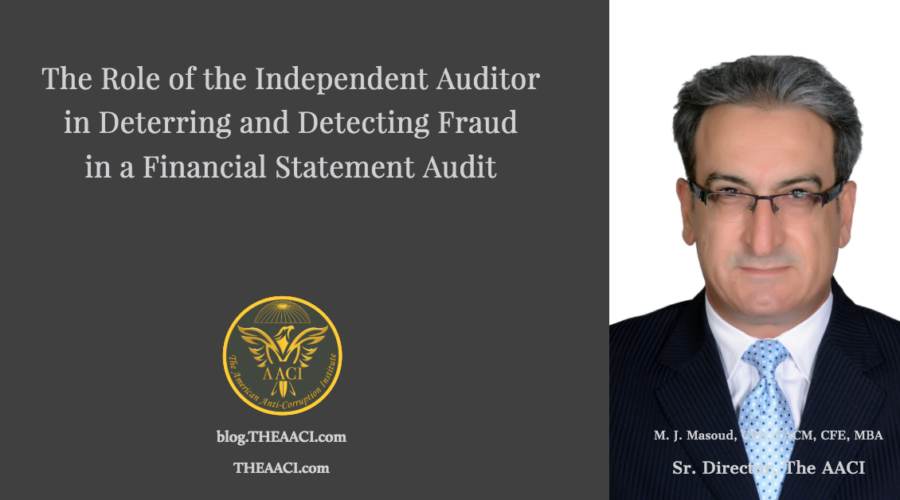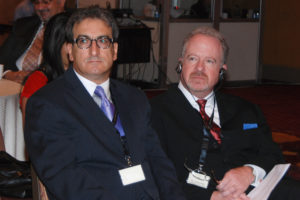September 21, 2019
The real value of the independent auditor’s report is providing credibility to its accompanying financial statements: statement of financial position, statement of comprehensive income, state of changes in equity, statement of cash flows, and the notes to the financial statements. Such credibility is a function of many variables. They are the auditor’s independence, competence, and ethics.
Independence, Competence, and Ethics
Independence must be in appearance and in fact. It is a state of mind. When an auditor does not become independent, he must state this fact in his audit report so that users of the financial statements become alert to this fact that affects the credibility of his audit opinion on the financial statements. When an auditor does not disclose his partiality “not being independent” in the audit report, his audit report becomes misleading to those who shall depend on it in making economic decisions. Should the auditor intend to hide this fact from the readers and users of the financial statements, such an act may form a basis for fraud or corruption.
The auditor’s competence means that he is an adept and knowledgeable of the International Standards on Auditing (ISAs), International Financial Reporting Standards (IFRS), and the local relevant laws, rules, and regulations. When the auditor expresses his opinion in the audit report, he says that he conducted his audit in accordance with the ISAs. The application of the ISAs means he applied ISA 240: The Auditor’s Responsibilities Relating to Fraud in an Audit of Financial Statements. It also means that the auditor applied ISA 250: Consideration of Laws and Regulations in an Audit of Financial Statements.
Unethical conduct of an audit leads to a misleading audit report. The auditor states in his audit report the following: ” We are independent of the Company in accordance with the ethical requirements that are relevant to our audit of the financial statements in (jurisdiction), and we have fulfilled our other ethical responsibilities in accordance with these requirements.”
The Auditor’s Deterrence Impact
The deterrence impact of the auditor in a financial statement audit relies on his competence, independence, and ethics. When the client knows that the auditor is qualified enough to detect his fraud in the financial statements, he will be hesitant to commit fraud. The higher the client perceives the auditor as being competent, independent, and of high ethics, the lower he shall commit fraud in the financial statements. In most fraudulent financial statements scandals, the auditor involvement is linked to his competence, independence, or ethics. Worst, in some cases, the auditor colludes with the company’s management to defraud the users of the financial statements.
Examples of Fraudulent and Corrupt Acts
It is beyond the scope of this article to list and discuss the types of fraudulent and corrupt acts in fraudulent financial statements. The following are examples of fraudulent acts:
1- Overstatement of revenues,
2- Fraudulent disbursements,
3- Masking bribery and corrupt payments,
4- Tax evasion,
5- Illegal acts associated with covering fraudulent acts, and
6- Money laundering.
What Do Financial Statements Users Expect from the Auditor?
Users of the financial statements expect the auditor to do his job professionally, legally, and ethically. They expect the auditor to:
1- Be impartial when he reports on the financial statements.
2- Maintain professional skepticism throughout the audit process.
3- Not to collude with the auditee’s management and give a blind eye on illegal acts in the financial statements such as tax evasion or money laundering.
4- Assure them the financial statements he reported on do not include any fraud or corruption.
Does the Auditor Say the Financial Statements Do Not Include Fraud?
No, he does not. The auditor states clearly in his audit report the following under the Auditor’s Responsibility section of his report:
” Reasonable assurance is a high level of assurance but is not a guarantee that an audit conducted in accordance with ISAs will always detect a material misstatement when it exists. “
Therefore, users of financial statements must be alert to the fact that the auditor does not guarantee that the financial statements he reports on are free from fraud or corruption. In other words, it is not unusual that an auditor issues an unqualified “clean” report while fraud and corruption exist in the accompanying financial statements.
It is not unusual that an auditor issues an unqualified “clean” report while fraud and corruption exist in the accompanying financial statements.
The Responsibility of Management
The auditee’s management is responsible for preparing and presenting fairly the financial statements, including their notes, in compliance with the IFRS. They are responsible for establishing and maintaining effective internal control systems to achieve the internal control objectives and prevent, deter, detect and correct identified fraudulent and corrupt acts on a timely basis. They are responsible for establishing and maintaining an anti-corruption policy and prudent anti-corruption culture. Users of the financial statements should make sure that management does all that so that they lower the fraud and corruption risks in a financial statements audit.
They are responsible for establishing and maintaining an anti-corruption policy and prudent anti-corruption culture.
But what if the auditor is not independent, competent or ethical? What if the auditee’s management is corrupt? What would happen?
The answer is simple and straightforward: corruption will thrive and the audit service becomes useless and valueless.
M. J. Maosud, Sr. Director of The American Anti-Corruption in the Middle East and Africa. Mike@THEAACI.com












































